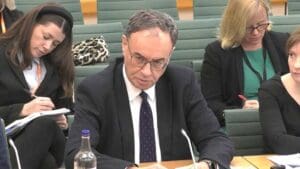Andrew Bailey, the governor of the Bank of England, has warned Chancellor Rachel Reeves that her government’s plans to roll back banking regulations could destabilise the UK’s financial system and risk triggering a future financial crisis.
Appearing before the Treasury select committee on Tuesday, Bailey said it would not be “a sensible” time to unwind safeguards such as bank ringfencing, which was introduced after the 2008 global crash to separate riskier investment banking from retail operations. The comments came in stark contrast to Reeves’ Mansion House speech, where she described the current regime as a “boot on the neck” of business.
Bailey, who now also chairs the Financial Stability Board, acknowledged that some policymakers may believe “the financial crisis is now way in the past” but stressed that from his perspective, “there remains a live threat to financial stability” that justifies retaining robust safeguards.
“For those of us who were veterans of sorting the problems of [the financial crisis] out, the risk is very much still there,” Bailey warned.
His comments came as new figures from the Office for National Statistics (ONS) revealed that UK government interest payments on debt surged to £16.4 billion in June, the second-highest figure for that month on record. The UK also borrowed £20 billion in June, outpacing forecasts from the Office for Budget Responsibility, and adding pressure on the Chancellor ahead of the autumn budget.
Despite the spike in borrowing costs, Bailey downplayed the UK-specific risk, saying it was part of a wider global trend driven by market volatility, geopolitical uncertainty, and higher deficit spending across major economies.
“We’ve seen an increase in term premiums and steeper yield curves across the board,” Bailey said. “This is a global phenomenon—not unique to the UK.”
The yield on the 30-year gilt has climbed to 5.43%, up from 4.67% a year ago, while the US equivalent has also risen sharply to 4.93%.
Bailey also pointed to President Donald Trump’s renewed trade war and “reciprocal tariffs” policy as a key driver of market volatility, saying that investors were reducing their exposure to dollar-denominated assets in response.
“The most crowded trade in the market at the moment is short dollar,” Bailey said, citing conversations with major institutional investors.
The dollar index has fallen by nearly 10% since January, while a breakdown in long-established market correlations has created significant uncertainty across asset classes.
“Since Trump first floated his tariffs in April, we’ve seen breakdowns in established correlations,” Bailey said. “Markets are rebalancing in response.”
Although stock markets initially slumped, they have since rallied sharply. The FTSE 100 this week closed at an all-time high above 9,000, buoyed by global tech stocks and investor hopes of monetary easing later this year.
Reeves’ plan to review and potentially dismantle the ringfencing regime—a central pillar of post-2008 banking reform—has drawn criticism from financial experts and former regulators including Sir John Vickers, who designed the original framework.
While the Chancellor argues that deregulation is essential to reviving Britain’s sluggish economy, critics fear the move could expose the public to the same systemic risks that triggered the last banking crisis.
Bailey stopped short of directly criticising Reeves but made it clear he would not have used language that described regulation as “a boot on the neck of business.”
As the Labour government pushes forward with its pro-growth reform agenda, Bailey’s warning stands as a stark reminder that financial stability and long-term risk management remain a delicate balancing act—especially at a time of elevated borrowing costs and global market disruption.
Read more:
Andrew Bailey warns Rachel Reeves that City deregulation could reignite financial crisis

